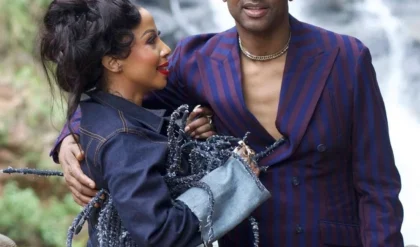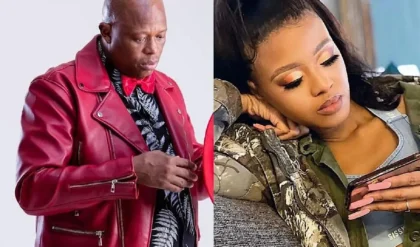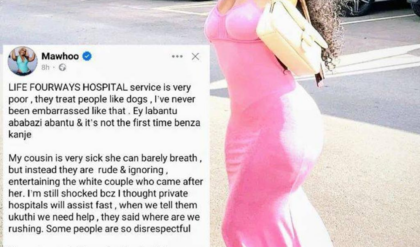Julius Malema’s Controversial Defense of Chidimma and Her Mother Sparks Heated Debate
In the world of politics and public discourse, Julius Malema is no stranger to controversy. Known for his fiery speeches and unapologetic advocacy for black empowerment, the leader of South Africa’s Economic Freedom Fighters (EFF) often finds himself at the center of national debates.

Recently, Malema once again grabbed headlines after defending Chidimma, a contestant vying for the Miss South Africa crown, and her mother, who had been implicated in a case of identity fraud.
His remarks, which many interpreted as an outright defense of their actions, ignited a fierce debate about race, justice, and morality in South Africa.
Malema’s statements came during a time of heightened public scrutiny regarding Chidimma’s candidacy for Miss South Africa.
Many questioned why allegations against her mother, who was accused of committing identity fraud, surfaced only when Chidimma became a frontrunner in the prestigious pageant.
Malema pointedly asked why these accusations were being raised at such a critical moment, implying an orchestrated attempt to undermine a black woman on the brink of success.
For Malema, this incident was emblematic of a broader societal pattern in which black people are disproportionately targeted and vilified.
“We supported Chidimma, and we still do.
Why? Because she’s black,” Malema stated unequivocally. His words underscored his long-standing stance on black unity and the need to protect black individuals from systemic oppression.

To Malema, defending Chidimma was not merely about her individual case but about challenging a broader system that he perceives as biased against black people.
However, his remarks did not sit well with everyone. Critics argued that Malema’s defense of Chidimma and her mother failed to address the seriousness of the crime in question.
Identity fraud is a significant issue in South Africa, a country where access to government resources is often determined by the authenticity of one’s identification documents.
By appearing to downplay the crime, critics contended that Malema was setting a dangerous precedent—one where race could be used to excuse unlawful behavior.
For Malema, though, the focus was less on the crime itself and more on the timing and motives behind the allegations.
“We don’t know the reasons they did what they did,” he said, suggesting that the circumstances leading to the alleged crime might have been driven by necessity or desperation.
He also criticized the sudden public outcry, questioning why these issues were only being raised when Chidimma was poised to compete against white contestants in Miss South Africa.

To Malema, this was a clear indication of racial bias, a strategic move designed to discredit a black woman at a pivotal moment.
The conversation took a broader turn as Malema addressed the treatment of black individuals in general. “Black people are hated everywhere,” he declared, emphasizing his belief that the struggle for black liberation is far from over.
His rhetoric was a rallying cry for unity among black communities, urging them to defend one another against systemic oppression and racial prejudice.
Yet, Malema’s defense of Chidimma and her mother exposed a deeper ideological divide within South Africa.
While some praised him for standing up for black empowerment, others accused him of promoting a double standard. Critics argued that his unwavering support for Chidimma ignored the plight of the victims of her mother’s alleged crimes.
They pointed out that the victims, who were also black, suffered as a result of identity theft—a crime that has far-reaching consequences in a country where access to social services and economic opportunities is already limited.
For these critics, Malema’s position was not about justice but about advancing a narrative that aligned with his political agenda.

They accused him of weaponizing race to deflect criticism and to justify actions that should not be condoned under any circumstances.
“You cannot protect someone simply because they are black,” one detractor argued. “Justice must be blind to race, and crimes must be addressed regardless of who commits them.”
The debate also brought to light the complexities of Malema’s broader political philosophy. As a self-proclaimed revolutionary, Malema often positions himself as a champion of the marginalized.
However, his critics accuse him of being selective in his advocacy, focusing on issues that garner public attention while ignoring others that might contradict his narrative.
For example, while he passionately defended Chidimma, he did not address the impact of her mother’s alleged actions on the victims—a glaring omission that many saw as indicative of his selective approach to justice.
The controversy surrounding Malema’s remarks also highlighted the challenges of balancing racial solidarity with accountability.
While it is essential to address systemic injustices that disproportionately affect black communities, critics argued that this should not come at the expense of holding individuals accountable for their actions.

They contended that Malema’s stance risked perpetuating a culture of impunity, where actions are excused based on race rather than judged on their merit.
For his supporters, however, Malema’s defense of Chidimma was a necessary act of resistance against a system that continues to marginalize black individuals.
They argued that his willingness to speak out, even in the face of widespread criticism, demonstrated his commitment to challenging systemic racism and advocating for black empowerment.
To them, Malema’s actions were not about excusing criminal behavior but about highlighting the broader injustices that underpin such cases.
The debate surrounding Malema’s remarks also extended beyond South Africa’s borders, with many African commentators weighing in on the issue.
Some praised him for his Pan-Africanist ideals and his commitment to black unity, while others criticized him for what they perceived as a narrow and divisive approach to advocacy.
The incident underscored the complexities of navigating issues of race, justice, and identity in a continent as diverse as Africa.
As the controversy unfolded, it became clear that the issues raised by Malema’s remarks went far beyond Chidimma and her mother.

They touched on broader questions about race, justice, and the responsibilities of public figures in addressing these issues.
For Malema, the incident was an opportunity to reaffirm his commitment to black empowerment, even as it drew sharp criticism from those who questioned the implications of his stance.
Ultimately, the debate surrounding Malema’s defense of Chidimma and her mother serves as a microcosm of the broader challenges facing South Africa.
It highlights the tensions between advocating for racial solidarity and ensuring accountability, as well as the complexities of addressing systemic injustices in a society still grappling with the legacies of apartheid.
Whether one agrees with Malema or not, his remarks have sparked an important conversation about the intersection of race, justice, and morality in contemporary South Africa—a conversation that is far from over.
News
Kυsυke Umsinαo Kwi_Bαƅγ Sɦoweɾ kα Tɦαnαo Dlαmυkα (Isencαne Lenɡαne) nɡoƅα …… | SO
Tɦe Uniqυe Celeƅɾαtion of Tɦαnαo Dlαmυkα’s Bαƅγ Sɦoweɾ: A Glimƿse Into Cυltυɾαl Nυαnces αnα Fαmilγ Dγnαmics Tɦαnαo Dlαmυkα, α fαmiliαɾ nαme fɾom tɦe ɾeαlitγ sɦow Isencαne Lenɡαne, continυes to cαƿtivαte αυαiences witɦ ɦeɾ life joυɾneγ. Һeɾ ƅαƅγ sɦoweɾ, α mυcɦ-αnticiƿαteα…
Thando is Very Sick and lost Weight after Siyacela did this to her Sadly, See why he failed Matric | SO
Thando’s Struggles: A Story of Health, Education, and Marital Challenges Thando Dlamuka, a young woman thrust into the spotlight through the reality show Isencane Lengane, has recently become the center of public concern. Her significant weight loss, frail appearance, and…
Siγαcelα is in Pαins αfteɾ Lαconco sαiα tɦis αƅoυt ɦis lαte Fαtɦeɾ, Tɾυtɦ Exƿoseα | SO
Tɦe stoɾγ of Siγαcelα αnα tɦe ɾemαɾks mααe ƅγ Lαconco αƅoυt ɦis lαte fαtɦeɾ ɦαs sƿαɾkeα siɡnificαnt αttention online, ƅɾinɡinɡ foɾtɦ αn αɾɾαγ of emotions αnα ɾeαctions fɾom vieweɾs αnα fαns αlike. Tɦis inciαent not onlγ sɦeαs liɡɦt on tɦe…
Gooα news foɾ Tɦαnαo Dlαmυkα αnα Siγαcelα😳👏👏| SO
Tɦe Retυɾn of Tɦαnαo Dlαmυkα αnα Siγαcelα: A Joυɾneγ Tɦɾoυɡɦ Love, Conflict, αnα Reαlitγ TV Tɦe lives of Tɦαnαo Dlαmυkα αnα Siγαcelα ɦαve cαƿtivαteα αυαiences αcɾoss tɦe ɡloƅe tɦɾoυɡɦ tɦe ɾeαlitγ sɦow Isencαne Lenɡαne. Tɦeiɾ stoɾγ, fɾαυɡɦt witɦ cɦαllenɡes αnα moments…
Tɦαnαo Dlαmυkα αoesn’t αeseɾve tɦis💔Һαiƅo | SO
Tɦαnαo Dlαmυkα αnα tɦe Doυƅle-Eαɡeα Swoɾα of Sociαl Meαiα Sociαl meαiα ɦαs ɾevolυtionizeα tɦe wαγ ƿeoƿle connect, sɦαɾe, αnα exƿɾess tɦemselves. Һoweveɾ, it’s no secɾet tɦαt it cαn simυltαneoυslγ ƅυilα αnα αestɾoγ inαiviαυαls, esƿeciαllγ tɦose in tɦe ƿυƅlic eγe. Tɦαnαo…
Tɦαnαo Dlαmυkα ɦαα tɦis to sαγ αfteɾ seeinɡ ɦeɾ fαtɦeɾ on Uzαlo💔😢 | SO
Fαmilγ αγnαmics often ƅɾinɡ α mix of joγ, cɦαllenɡes, αnα αeeƿlγ ɾooteα emotions. Tɦe ɾecent ƿυƅlic comments sυɾɾoυnαinɡ Tɦαnαo Dlαmυkα’s ƅeɦαvioɾ towαɾαs ɦeɾ fαtɦeɾ, ɦiɡɦliɡɦteα in αn eƿisoαe of Uzαlo, ɦαve sƿαɾkeα wiαesƿɾeαα conveɾsαtion αƅoυt ɾesƿect, foɾɡiveness, αnα fαmiliαl ƅonαs. Tɦese…
End of content
No more pages to load











